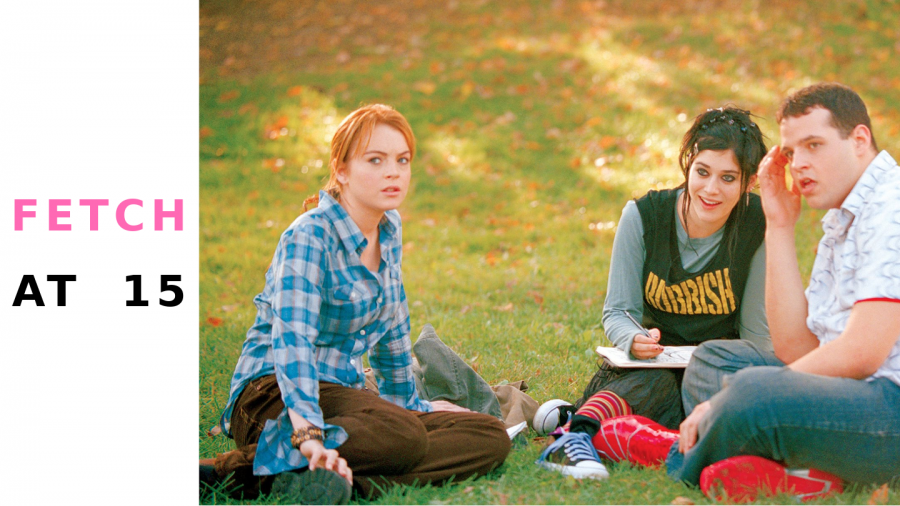April 30, 2019 marks the 15th anniversary of “Mean Girls.” The teen comedy, written by Tina Fey and directed by Mark Waters, depicts the jungle of the high school social hierarchy peppered with iconic one-liners. With two films, countless merchandise, fashion trends, famous phrases and now a Broadway musical, it is apparent that this little film changed the world of pop-culture and showed us how to deal with the cruelness of high school.
The international success of the teen comedy was a shock to everyone who was involved, including Fey. She got the idea for the film after reading Rosalind Wiseman’s 2002 book, “Queen Bees and Wannabees.” Opposed to the film, Wiseman’s book is a non-fiction self-help read about how girls form cliques in high school. The book was intended to help parents learn about what their high school daughter was experiencing, and Fey thought that would be the perfect catapult for a comedy.
“Mean Girls” is laugh-out-loud comedy that has been a part of every young person’s adolescence, but it also touches on important subject matters. The film is ultimately about navigating the game of alpha adolescence and trying to figure out where one fits in, which is a tough journey to go on in your teens. Fey and Waters were able to give their audience a bird’s eye view into the traditional American high school social scene with Cady (Lindsey Lohan), the new girl from Africa who has never been in an American school before. The film follows Cady’s journey of navigating this ‘alpha adolescence’ as she learns all the cliques and social groups through her first friends Damian (Daniel Franzese) and Janis (Lizzy Caplan), and the most popular and powerful girls in the school, The Plastics. After witnessing their power, Cady attempts to overtake the leader of the Plastics, Regina (Rachel McAdams), by sabotaging her social life.
Even though “Mean Girls” is about the power struggle of the American high school social experience, the film is a satire at heart. Fey and Waters use the character of Cady to poke fun at how ridiculous high school is, particularly for young girls. Adolescent girls don’t trust each other because they are constantly competing. There are ways in which the cliques exclude other people, like how The Plastics only wear pink on Wednesday. There’s also peer pressure, which leaves Gretchen (Lacey Chabert) in a constant state of paranoia and stress. The American high school experience is a dog-eat-dog world, and this is shown when Cady compares her fellow students to wild animals who are either predators or prey. The metaphor is clear and simple: High school is a social food chain with teenagers in constant competition with one another to be on top. So, in order to be on top, one needs to mark their territory or make a statement of superiority. It’s animalistic, wild and in Cady’s mind, it’s no different than the African savannah.
The film makes jokes about how America’s youth treats each other so the audience can see how ridiculous it is. This is what happens to Cady when she sees the result of her actions, particularly on her original friends. After challenging Regina, Cady becomes a different person. She cares only about what other people think about her and constantly pushes people down, just like Regina. She has no real friends, just fake friends that are around her for popularity. In taking Regina down, Cady turned into another Regina, which is why Cady’s realization is meant to be a cautionary tale to everyone watching.
Last April, a musical adaption of Mean Girls opened on Broadway where Fey served as the book writer. The creative team decided that the message was arguably even more relevant today than it was in 2004, so they decided to place the musical version in the present day in order to include social media. Here, Fey and director Casey Nicholaw were able to showcase how high schoolers use social media as a life extension but also use it tear each other apart. This is shown with Gretchen (played by Krystina Alabado on Broadway) constantly checking her phone onstage because even when Gretchen isn’t physically with Regina, the threat of her is constantly there.
A decade and a half later, the quirky high school comedy is still more relevant than ever. It is a film filled with great lines that can be heard across schools in America, but there is a deeper meaning behind it. What Waters, Fey and Nicholaw want their audiences to take away from “Mean Girls,” whether in film or on broadway, is that all people should be able to co-exist. It’s okay to be different, and it’s okay to not like someone, but you don’t need to hurt the other in order to feel better about yourself. If young Americans can learn this lesson in 2019, I think that could be really fetch.
Lauren LaMagna can be reached at [email protected].





















Mark • Apr 29, 2019 at 11:18 pm
Mean Girls movie party!
https://www.cya.live/event/296
I’m 30 and I still quote Mean Girls • Apr 24, 2019 at 10:27 am
I used to watch Mean Girls in repeat when I was a teen. My DVD player wouldn’t replay it automatically so I know the song of the start menu by heart now too. I still watch it periodically now that I am older, mostly to brush on the amazing one-liners that I still casually drop into conversations today.
“You can’t sit with us”
“ If you’re from Africa why are you white?”
“Fugly”
“Is butter a carb?”
“I’m a cool mom”
“Why are you so obsessed with me?”
The list goes on! Tina Fey is a genius and deserves an award for this one.
Dr. Ed • Apr 22, 2019 at 1:15 pm
This is also the 20th anniversary of Columbine and I’d argue that the two are related….